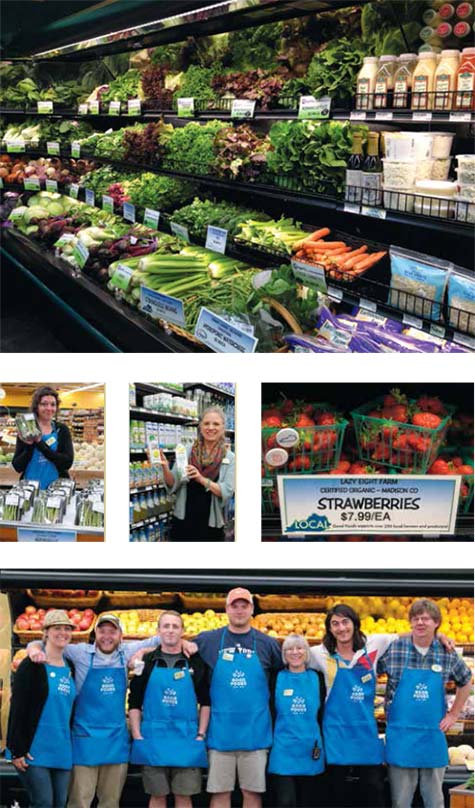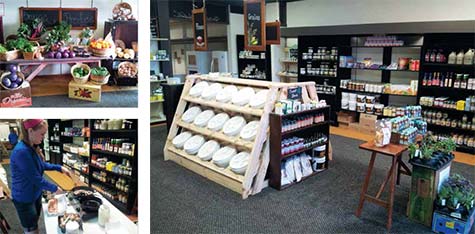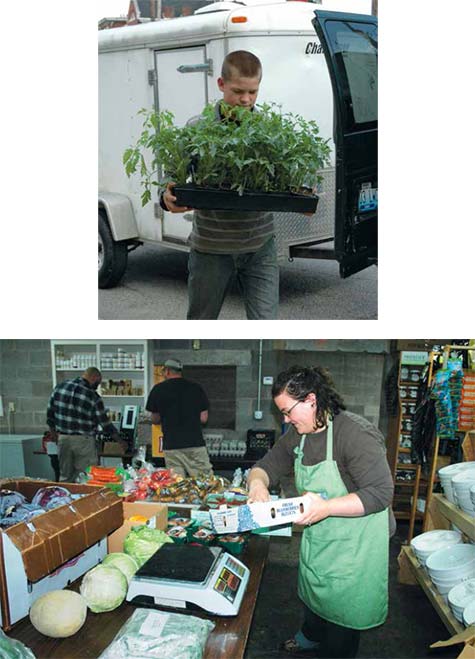Shared Goal, Different Approach
There’s no denying modern supermarkets provide consumers variety, but they don’t always provide them choice. What’s on the shelf is what they get, be it grown sustainably, organically or otherwise.
Many years ago, the desire for more options gave rise to food cooperatives in the U.S. Groups of like-minded member-owners wanted full control over the foods that they bought and consumed. They sought fresh, natural and whole foods grown and raised sustainably rather than heavily processed sustenance laden with preservatives. They researched and voted on what foods the co-op would source and they shared in the workload of acquiring and distributing it.
Today, some co-ops are small groups consisting of just a few members sharing, buying and storing food in a single member’s garage. Others have hundreds of members who own or rent a central distribution point and pay administrators to research foods and manage members’ orders.
The largest are actual supermarkets that plug into co-operative federations made up of multiple co-ops. Working as one, those co-ops gain cost savings through higher-volume purchases. The National Cooperative Grocers Association (NCGA) is one such example and has 146 members. Kentucky has three successful co-ops—in Louisville, Elizabethtown and Lexington—that not only are standing the test of time, they’re growing. We took a look into how they’re working.
Good Foods Co-Op
- Lexington Founded: 1972
- Members: 6,700
- Cost: $200 one-time “ownership investment”
Like many co-ops, Good Foods Co-Op in Lexington was launched in a garage. Locals couldn’t find basics like yogurt or whole-wheat flour at supermarkets, so in 1972, they took the buying into their own hands by connecting to Kentucky providers. Slowly but surely the idea got traction and membership grew.
Today there are 6,700 owner-members and “the co-op,” as it’s known in Lexington, is in its sixth facility. The 11,000-square-foot building includes a large café and prepared foods section. It employs 120 people and generated $11.69 million in revenue in 2013. Its $281,000 net profit was shared with its owners and reinvested into the business.

“This has to be run like a business in order for it to survive and thrive,” said Anne Hopkins, its longtime general manager. “How else should we manage our owners’ money?” Good Foods is the lone independent grocer in Lexington, though it is a NCGA member. Its owners, who make a $200 one-time investment for a share of the business and the access to modest discounts, accounted for $6.1 million of those sales. The rest came from nonmembers who want good food at fair prices.
Good Foods’ success has drawn competitors such as Whole Foods, Trader Joe’s and supermarkets that have added organics sections. But that doesn’t bother Hopkins. “It may sound crazy, but we’re glad that those stores are here, and we’re even glad Kroger is selling organic foods,” she said. “It raises awareness of good foods, and that increased awareness helps us all.”
Just as importantly, Hopkins said the GFC exists to help local farmers, people its owners believe aren’t paid enough for their labor.
“We have to play a role in seeing that they earn a living wage because we want them on the farm,” said Hopkins, adding that GFC spent $1.1 million on goods from Kentucky farmers last year. To be branded “local,” she said, it must come from the state. “Other stores consider a certain radius of miles ‘local,’ but we stick to Kentucky.”
Hopkins said GFC’s board listens to all requests for new products, but any choice has to make its case at the cash register.
“When I look at those slots on those shelves, I see those as apartments,” Hopkins said. “They’re like tenants who have to pay their room and board or they get evicted.” Naturally, members don’t always agree on every issue, said Patty Cooper, a 21-year member-owner. But she said the democratic process works well and allows the board to make good decisions.
“When you go to a meeting and speak up, you know people really hear you and care about what you think,” she said. “It’s a truly remarkable institution.”
Heartland Whole Life Buying Club
- Elizabethtown Founded: 2007
- Members: 500
- Cost: $125 one-time initiation fee
When Serena Erizer’s father fell ill several years ago, she suspected his less-than-ideal diet might be causing it. Later when her youngest son developed food allergies, she stopped studying whole foods and started buying them everywhere she could.
“If famers had a sign in their yard saying they sold grass-fed beef, I knocked on the door,” said Erizer, who co-founded Heartland Whole Life Buying Club in 2007. “I’d stop and pick up eggs that way, apples at orchards, too.” Her friends wanted in on her fresh provisions, so she started buying for them as well.
“I’d be driving around with 20 gallons of milk in an SUV sometimes,” Erizer said. “Eventually it would take up my entire day gathering up everyone’s food, and I knew I couldn’t keep doing that. But I knew there was a need for it.”
She hosted a meeting to discuss creating a co-op and 30 people attended. Two months later, she and co-founder Lori Smith started collecting members’ orders, picking up local beef and dairy products and selling them from a donated refrigerator in Erizer’s garage.

Erizer said collecting and placing individual customers’ orders quickly became time-intensive, so the co-op began operating more like a store, buying cases of fresh product and letting members choose what they wanted. Perishable produce, Erizer said, remains difficult to manage, “but there are just some weeks when my family winds up eating a lot of peppers.”
In addition to about two dozen local suppliers, Heartland works with a local produce wholesaler to source organic fruits and vegetables.
Last year, with more than 400 members on its rolls, Erizer and Smith went hunting for a traditional retail space. They found an ideal location, but suspected they couldn’t get a bank loan approved before someone else bought it. A local businessman who wanted to see Heartland in the building acted for them.
“He asked us, ‘If I go and buy this building, will you promise to rent it?’” Erizer recalled. She told the owner what they could afford to pay, and he agreed on the price. “God has led us the entire way on this. It is the perfect space for us, a real store!”
WHOLE LIFE BUYING CLUB
- Louisville Founded: 2006
- Members: 600+
- Cost: $20 annual dues plus $100–$150 on-going account balance
Louisville’s Whole Life Buying Club doesn’t just supply natural foods to its members, it also provides education to those who want to eat better yet don’t know how to prepare food.
“We often attract people who are very new to real food and who’ve never seen a whole chicken,” said John Moody, the club’s cofounder and lead administrator. “It’s intimidating, so we hold cooking classes. … Ideally we want people to learn to use the whole animal.”
Moody’s family was one of six who started the club in order to secure supplies of grass-fed beef, raw milk products and non-GMO food. He proudly called the club “fanatical about sourcing,” and said “members appreciate administrators researching farms and foods they want to buy. It’s a service to them and we’ve invested a lot of effort into knowing where things stand in Kentucky.”
He said their research also has helped farmers raise their standards for sustainability.
“We’ve helped them improve their growing methods and helped some switch over to non-GMO and non-herbicide feeds,” he said. But there’s more work to do to meet member desires, he added. “We want to see butchering options improved in Kentucky because there’s a wide array of things we still have to get out of state.”

The co-op has grown steadily, Moody said, requiring moves to four different locations. When it soon adds its first walk-in refrigerator, it’ll relieve member volunteers from having to hold product in a mix of upright refrigerators and ice-packed coolers.
Moody said the co-op has a solid volunteer force, including members facing financial need who work for food credit. “They’re paid $12 per hour in food credit, they do excellent work and work very hard,” Moody said, adding that members who have extra income often share it when capital needs arise. “One member volunteers by donating his computer server and keeping that up to date.”
Whole Life’s stiffest challenge, however, came in May 2011, when Louisville’s health department served it cease and desist and quarantine orders for its distribution of 76 gallons of raw milk.
When Whole Life showed that members as individual citizens, not the club, had contracted for that milk, they defied the orders and took their milk. About a week later, the city backed off.
“That was both the biggest hurdle we’ve ever faced, and our biggest victory,” Moody said. “We stood up for our rights as consumers who should have choices to eat what we believe is good for us and our families.”








